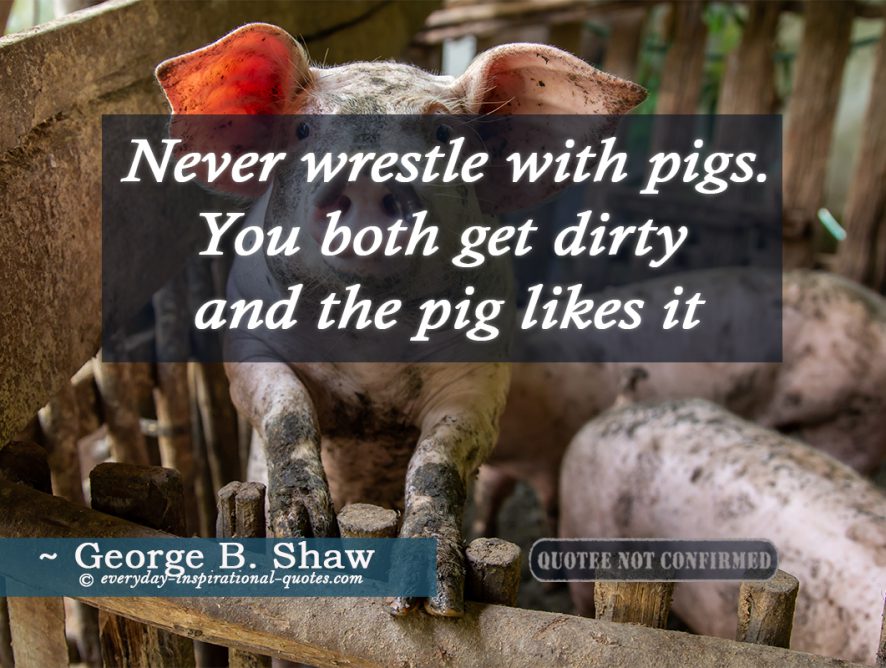The aforementioned quote is attributed to George Bernard Shaw, but no evidence supports this claim. This statement was used first by Canadian-American Industrialist Cyrus S. Ching in 1948. However, he attributed it to his uncle (at another time to his grandfather). Though he never ascribed this statement as his own, he used it quite frequently leading to its popularity.
The aforementioned quote also appeared in the July 1964 edition of the Army Research and Development newsmagazine (pg. 20). The writer explains this statement as another wording of the Chinese proverb; In shallow waters, shrimps make fools of dragons
Although this quotation is ascribed to a number of personalities including George B. Shaw, Abraham Lincoln and Mark Twain. There is no evidence supporting any of these claims. It is not known where it exactly came from.
What is the meaning of the quote?
The first part of the statement i.e. never wrestle with a pig is an idiomatic expression that prevents a person from engaging in conversation or an argument with an opponent that does not play by the same rules as them, your opponent is willing to lie or misrepresent information for the sole purpose of winning an argument and in case of loosing they will just throw a tantrum. Hence, arguing with such individuals will not bring you any benefit whether you win or lose
The part that claims that pigs enjoy it implies that such an argument will only bring you down to their level which will be a source of happiness for them. They might have a sense of pleasure in bringing you down instead of learning something from a discussion.
Therefore, you will not only tire yourself but also harm your honor and self-respect. A fool engages in an argument with the sole purpose of arguing and will drag you down to their level. If you knowingly engage in an argument with a fool, you are digging a hole for yourself. People who are not very smart are usually very adamant about their beliefs and are not willing to consider alternatives.
Who was George B. Shaw
George Bernard Shaw has been covered in another post . To quickly review, he was an Irish critic, playwright and political activist. At an age of 20, he moved to London and started working as a music and art critic. By the 1880s, he was able to establish himself as a successful writer and novelist after years of struggle and self-education. He used his plays as means of publicizing his political and cultural ideas. This proved influential for Western theater and earned him the Nobel Prize for Literature in the year 1925. His notable works include Man and Superman, Pygmalion and Saint Joan
Knowing when not to engage in an argument
Today more than ever, we are prone to getting involved into arguments be it online or in person. Many times we get into heated arguments arising from differences of opinion. However, upon deeper inspection, we get to know that most of our arguments are fruitless and vain. Therefore, it is necessary that we know when to avoid arguing with certain individuals or parties.
One example of vain arguing is getting into arguments with strangers. Most such arguments occur over social media where neither of the two individuals care to listen to the opinions of the other. Such arguments are fueled by emotions rather then logic. Engaging in such arguments will leave you empty and stressed without any benefits.
Some people argue just for the sake of it. They have no interest in listening to the other person’s opinion or learning something new. When you engage in arguments with such people, the argument will escalate without you even knowing. Such individuals will do everything to prove themselves right and cause you to lose your temper. Before you know it your voice will be raised and your tone will be changed eventually resulting in you losing your cool.
How can arguments be beneficial?
Contrary to the previous discussion, not all arguments are bad.If you are engaged with someone who is mature enough to argue in a constructive manner, you can have countless benefits from it. Here are some ways arguments can be beneficial;
- Arguing helps you understand the other person’s perspective and facilitates communication. This can have a positive effect on your relationships.
- An unbiased argument can help you uncover the truth and clarifies your thinking. It can also lead to you strengthening your viewpoint of something.
- It enables you to evaluate conflicts and provides you with ways to judge different opinions that people may have.
- You can learn about your shortcomings which paves way for self-improvement.
Surrounding yourself with open-minded people
In order to avoid conflict and baseless arguing, it is important that you are people who are open-minded to differences that may arise. It is important to have the right people around you to shape your personality and behavior. This goes both ways, if you yourself are someone who radiates positive energy, you’re bound to have such people around you.
Thus, in order to surround yourself with open-minded people, you have to be open-minded yourself first. Humility is something that can make you open-minded and accepting of the differences among people. When you are humble, you consider people around you as your equals and not inferiors. This makes you considerate of their beliefs and opinions and not outright reject it.
The advantage to being surrounded by open-minded people is that they tend to maintain their calm even in disagreements. Only in such an environment, you are able to voice your opinion without the fear of being attacked. Hence, it is important that we ourselves learn and surround ourselves with people who know how to remain respectful even in disagreements.

